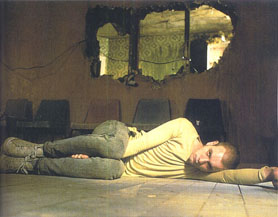Viking Night: Trainspotting
By Bruce Hall
March 9, 2010
Understanding this, Renton makes repeated efforts to quit heroin but is hampered at every turn by the influence of his so called friends. There is Sick Boy (Johnny Lee Miller), an amoral con-man who would gladly steal money from his own mother, in the event he could locate her. Spud (Ewen Bremner) is the follower of the group, a kind hearted but simple lad who is obsessed with winning the approval of others. Begbie (Robert Carlyle) is less a friend than he is a dangerously unstable sociopath who requires an obedient entourage. And then there's Tommy (Kevin McKidd), a comparatively untainted, impressionable young man who doesn't use drugs but being fascinated by the lifestyle, hangs around with the gang anyway. Easily the most thoughtful and articulate of this bunch, Renton still finds it difficult to extricate himself from the tempest of drugs, petty crime and self induced poverty he and his friends inhabit. Despite his best intentions he finds that it feels good to be bad - and not only are his friends all inveterate enablers, but they tend to bring out the worst in one another. Lifelong friends usually share many of the same interests and values - but this is a group of people whose interests are merely vice, and whose values are virtually nonexistent. When sober, they have almost nothing in common and are barely able to tolerate one another's company - and when under the influence of either heroin or alcohol, the only thing they truly share is their inebriation. As much as anything, Trainspotting is a film about doomed friendships and weak people who overcome their frailties with dependencies. And that's one of the most fascinating aspects of Trainspotting, the fact that the concept of dependency is approached from a number of different directions and shown to have a variety of causes. One could almost say that despite being a "drug film," at its heart it isn't really about drugs at all.
There is a broader theme addressed by Trainspotting and it is that we are all at one time or another, in times of weakness or doubt, driven to cling to things. But there are habits and there are vices, and it isn't always easy to agree on which is which, or how it is that we become enslaved by them.
Sick Boy has never told the truth in his life, and the fact that he's chosen deception as a way of life has left him a sad, lonely person without any true friends. Eventually the one good thing he does have going for him is tragically lost in the midst of a hedonistic drug binge.
Spud seems to be vaguely aware of his limitations, but his lust for approval ensures that he's always in the wrong place at the wrong time and he always seems to be paying for things others have done. Begbie is a haunted man who never knew his parents and is motivated principally by the white hot furnace of rage that misfortune has sparked inside him. His every waking moment is devoted to punishing the world for what he's become and predictably, it causes nothing but trouble for those closest to him. Tommy and Renton seem to be the closest in temperament, but Tommy is emotionally dependent on his girlfriend and the thrills they get from hanging around their rowdy friends.
So, when one of Renton's good natured pranks goes terribly wrong, Tommy inevitably finds himself at a dangerous crossroads and the path he chooses comes to have far reaching consequences for everyone. And the theme of emotional subjection isn't limited to youth - Renton's parents choose to turn a blind eye to their son's activities until it is too late. His mother soothes her guilt with the "socially acceptable" sin of Valium; his father uses a proud man's stubborn sense of denial.
Continued:
1
2
3
4
|
|
|
|




